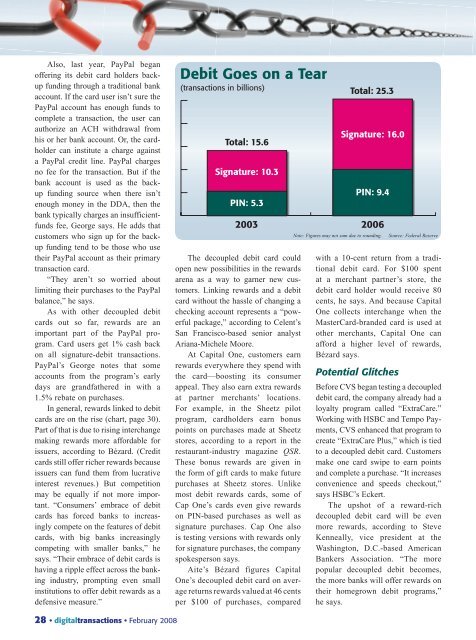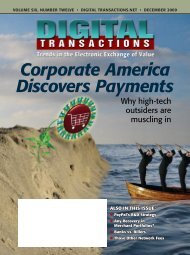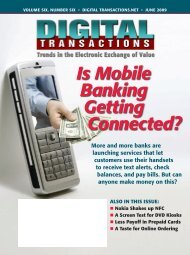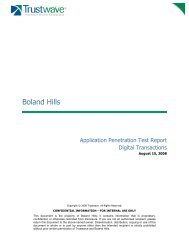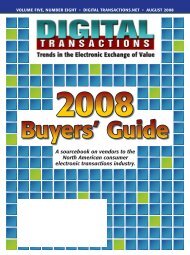The Broken Link - Digital Transactions
The Broken Link - Digital Transactions
The Broken Link - Digital Transactions
You also want an ePaper? Increase the reach of your titles
YUMPU automatically turns print PDFs into web optimized ePapers that Google loves.
Also, last year, PayPal began<br />
offering its debit card holders backup<br />
funding through a traditional bank<br />
account. If the card user isn’t sure the<br />
PayPal account has enough funds to<br />
complete a transaction, the user can<br />
authorize an ACH withdrawal from<br />
his or her bank account. Or, the cardholder<br />
can institute a charge against<br />
a PayPal credit line. PayPal charges<br />
no fee for the transaction. But if the<br />
bank account is used as the backup<br />
funding source when there isn’t<br />
enough money in the DDA, then the<br />
bank typically charges an insufficientfunds<br />
fee, George says. He adds that<br />
customers who sign up for the backup<br />
funding tend to be those who use<br />
their PayPal account as their primary<br />
transaction card.<br />
“<strong>The</strong>y aren’t so worried about<br />
limiting their purchases to the PayPal<br />
balance,” he says.<br />
As with other decoupled debit<br />
cards out so far, rewards are an<br />
important part of the PayPal program.<br />
Card users get 1% cash back<br />
on all signature-debit transactions.<br />
PayPal’s George notes that some<br />
accounts from the program’s early<br />
days are grandfathered in with a<br />
1.5% rebate on purchases.<br />
In general, rewards linked to debit<br />
cards are on the rise (chart, page 30).<br />
Part of that is due to rising interchange<br />
making rewards more affordable for<br />
issuers, according to Bézard. (Credit<br />
cards still offer richer rewards because<br />
issuers can fund them from lucrative<br />
interest revenues.) But competition<br />
may be equally if not more important.<br />
“Consumers’ embrace of debit<br />
cards has forced banks to increasingly<br />
compete on the features of debit<br />
cards, with big banks increasingly<br />
competing with smaller banks,” he<br />
says. “<strong>The</strong>ir embrace of debit cards is<br />
having a ripple effect across the banking<br />
industry, prompting even small<br />
institutions to offer debit rewards as a<br />
defensive measure.”<br />
Debit Goes on a Tear<br />
(transactions in billions)<br />
Total: 15.6<br />
Signature: 10.3<br />
PIN: 5.3<br />
<strong>The</strong> decoupled debit card could<br />
open new possibilities in the rewards<br />
arena as a way to garner new customers.<br />
<strong>Link</strong>ing rewards and a debit<br />
card without the hassle of changing a<br />
checking account represents a “powerful<br />
package,” according to Celent’s<br />
San Francisco-based senior analyst<br />
Ariana-Michele Moore.<br />
At Capital One, customers earn<br />
rewards everywhere they spend with<br />
the card—boosting its consumer<br />
appeal. <strong>The</strong>y also earn extra rewards<br />
at partner merchants’ locations.<br />
For example, in the Sheetz pilot<br />
program, cardholders earn bonus<br />
points on purchases made at Sheetz<br />
stores, according to a report in the<br />
restaurant-industry magazine QSR.<br />
<strong>The</strong>se bonus rewards are given in<br />
the form of gift cards to make future<br />
purchases at Sheetz stores. Unlike<br />
most debit rewards cards, some of<br />
Cap One’s cards even give rewards<br />
on PIN-based purchases as well as<br />
signature purchases. Cap One also<br />
is testing versions with rewards only<br />
for signature purchases, the company<br />
spokesperson says.<br />
Aite’s Bézard figures Capital<br />
One’s decoupled debit card on average<br />
returns rewards valued at 46 cents<br />
per $100 of purchases, compared<br />
Total: 25.3<br />
Signature: 16.0<br />
PIN: 9.4<br />
2003 2006<br />
Note: Figures may not sum due to rounding.<br />
Source: Federal Reserve<br />
with a 10-cent return from a traditional<br />
debit card. For $100 spent<br />
at a merchant partner’s store, the<br />
debit card holder would receive 80<br />
cents, he says. And because Capital<br />
One collects interchange when the<br />
MasterCard-branded card is used at<br />
other merchants, Capital One can<br />
afford a higher level of rewards,<br />
Bézard says.<br />
Potential Glitches<br />
Before CVS began testing a decoupled<br />
debit card, the company already had a<br />
loyalty program called “ExtraCare.”<br />
Working with HSBC and Tempo Payments,<br />
CVS enhanced that program to<br />
create “ExtraCare Plus,” which is tied<br />
to a decoupled debit card. Customers<br />
make one card swipe to earn points<br />
and complete a purchase. “It increases<br />
convenience and speeds checkout,”<br />
says HSBC’s Eckert.<br />
<strong>The</strong> upshot of a reward-rich<br />
decoupled debit card will be even<br />
more rewards, according to Steve<br />
Kenneally, vice president at the<br />
Washington, D.C.-based American<br />
Bankers Association. “<strong>The</strong> more<br />
popular decoupled debit becomes,<br />
the more banks will offer rewards on<br />
their homegrown debit programs,”<br />
he says.<br />
28 • digitaltransactions • February 2008


